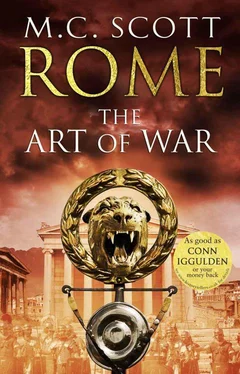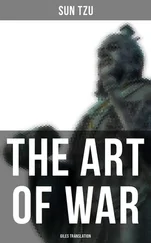M. Scott - The Art of War
Здесь есть возможность читать онлайн «M. Scott - The Art of War» весь текст электронной книги совершенно бесплатно (целиком полную версию без сокращений). В некоторых случаях можно слушать аудио, скачать через торрент в формате fb2 и присутствует краткое содержание. Жанр: Исторические приключения, на английском языке. Описание произведения, (предисловие) а так же отзывы посетителей доступны на портале библиотеки ЛибКат.
- Название:The Art of War
- Автор:
- Жанр:
- Год:неизвестен
- ISBN:нет данных
- Рейтинг книги:3 / 5. Голосов: 1
-
Избранное:Добавить в избранное
- Отзывы:
-
Ваша оценка:
- 60
- 1
- 2
- 3
- 4
- 5
The Art of War: краткое содержание, описание и аннотация
Предлагаем к чтению аннотацию, описание, краткое содержание или предисловие (зависит от того, что написал сам автор книги «The Art of War»). Если вы не нашли необходимую информацию о книге — напишите в комментариях, мы постараемся отыскать её.
The Art of War — читать онлайн бесплатно полную книгу (весь текст) целиком
Ниже представлен текст книги, разбитый по страницам. Система сохранения места последней прочитанной страницы, позволяет с удобством читать онлайн бесплатно книгу «The Art of War», без необходимости каждый раз заново искать на чём Вы остановились. Поставьте закладку, и сможете в любой момент перейти на страницу, на которой закончили чтение.
Интервал:
Закладка:
I had faced death in battle so often that I had come to think myself immune to fear. That morning, I had learned that I was not.
Sweat ran like rain off my face, while the rest of me was shaking with cold and fright. I wrapped my arms about my ribs, testing the bruises and the long line of the knife cut, and discovered that someone had draped my campaign cloak about my shoulders.
For decency’s sake, I should have pulled it tight and belted it, but I made a decision a long time ago not to hide myself from my men, and so I let them see for themselves the crusting on my thighs and the shivers that racked me, and the heavy, hollow breathing, like a horse that had just lost its race.
It wasn’t enough though; they were waiting for more and the press of their patience was giving me a headache.
I looked up, squinting against the brazier’s heat. ‘Demalion?’
Demalion of Macedon had been my personal aide for the past two years. He was the only man I knew who would have had the compassion to think of a cloak at a time like this.
Demalion is tall and dark of hair and would be heart-breakingly comely were he not so weighed down by old grief. When I first took him on as my aide, I promised myself that if I ever saw him smile, I would open the flask of Falerian I had brought with me when I left Caenis.
‘My lord?’
Not tonight, evidently, for the man who stood just beyond the rim of the fire’s red glow was not smiling, and was not Demalion.
If Demalion was striking, Pantera — the spy, whose name meant ‘leopard’ — was the kind of man who could blend into the background in a crowd of two.
And, of course, he was the one who had broken into my tent and led the capture of the assassin; I should have known him sooner.
What can I say of him? If you know Demalion’s story, you will know how Pantera and I first met. After the re-formation of the XIIth, he joined me for some of the Judaean campaign and I made use of him, or him of me; I never knew which, although in an odd kind of way I trusted him more than many of the men around me.
He was a spy, subterfuge was his world, but he had a kind of integrity that seemed real to me and I believed that he spoke the truth when he chose to speak.
He wasn’t saying anything just then. He was simply standing on the other side of the fire, a shadow beyond the rim of light, with nothing exceptional about him. He was of middling height, of middling build, with hair of a middling brown and middling skin tanned by wind and sun, neither as dark as the Syrians nor as pale as the northmen of the Germanies.
It was only when he moved that he set himself apart: despite all his injuries, he had a feline grace about him that had my hair standing on end, such as I have left.
‘Pantera,’ I said. No joyous reunion this, everything quiet; he demanded that, somehow. ‘I thought you were in Rome?’
‘I was. I left at the end of April.’
Which would have been when he heard news of Otho’s death; when Vitellius was acknowledged emperor.
I didn’t ask why he had left then, nor why he had come to me now; the answers were obvious, and I hated them.
Even so, to have travelled from Rome to our camp in two months was impressive, but I couldn’t find anything to say that didn’t sound patronizing and so instead I tipped my head towards the tent flap, and the growing sounds of chaos outside.
‘Where’s Demalion?’
‘Making the assassin ready for questioning.’
Two questions answered, and neither of them had I asked: yes, the intruder was an assassin; yes, he had survived his capture. Such economy of thought.
‘A centurion?’ I asked, but it was more of a comment than a question. It’s always the centurions who are sent to do the dirty work; they make the most dedicated and efficient killers.
In any case, this one was hardly the first. Galba had sent one to kill me when he first made himself emperor just after Nero’s death. Otho, his murderer and successor, would no doubt have got round to sending another if he hadn’t been so busy trying to fend off Vitellius. And now Vitellius, or more probably Lucius, his younger, more ambitious, more ruthless brother, had sent yet another to accomplish what the others had failed to do.
Truly, any questioning was only for the men, to assuage their need for retribution; we knew the answers, or so I thought. My only real doubt was whether, without Pantera, he would have been stopped in time.
But the legions expect certain things, and there are rituals that must be observed, not least by a general whose life has been saved by the diligence of his staff.
I set down the mug and lumbered to my feet when I would have just as happily gone back to bed. ‘What do I need to know before we go out there?’
That was the thing about Pantera, you could ask him these things and expect a decent answer.
‘Not a great deal. His name is Publius Fundanius. He was a local man, a Syrian, recently promoted to the third cohort of the Tenth. Seneca always said that the best agent was the officer of the enemy you turned to your own ends, but the second best was the local man, who knew the lie of the land and could chart his way about it. With this man, Vitellius had both woven into one; a local man who was also an officer in your ranks.’
‘What did they offer him?’
‘A commission in the new Praetorian Guard.’
‘But he isn’t Roman.’
‘That doesn’t matter any more. The new emperor is in the process of turning the entire First Germanica and the Fourth Macedonica into Guards.’
‘Hades, is he?’
That was news, and there was little enough of that from Rome just then. I was like a starving man shown a roast goose, desperate to rip it apart with my bare hands.
‘He’s taking risks, isn’t he? The men of the Macedonica are raised from the barbarian tribes around the Rhine. They may be citizens, but only because their grandfathers fought for Caesar and their fathers for Tiberius. The Germanica are worse. If you’re going to pay your Guard twice what you pay everyone else, you’d have thought you’d take care to choose them wisely; at least pick real Romans. In any case, Rome has nine cohorts of the Guard already; how many does a man need to make himself feel safe?’
Pantera smiled, just a little. Have you ever seen him with a smile on his face? He was a different man, suddenly; younger, with a spark like a street urchin.
He cocked one brow and said, ‘He’s made sixteen new cohorts of the Guard and four Urban cohorts, each of a thousand men.’
‘That’s twenty thousand men!’ You could have heard that shout in Syria. ‘Is he insane? Rome will burn, those parts that have not been pillaged!’ And then, ‘What’s he doing with the old Praetorians, the ones who supported Otho?’
‘He decommissioned them; paid their pensions and ordered them out of Rome. Also the astrologers: they have to be gone by the first of October, on pain of death.’
I wanted to sit down, to call for wine, to bank up the brazier and pepper Pantera with questions about Rome and her new emperor. What was Vitellius doing with his power? Was it true that he was driven by his brother, that Lucius was the real power behind the throne?
But outside, a man gave a single, quiet order and another voice was choked off in the kind of noise that only animals make, or men in great pain.
I stood and Pantera handed me my belt and made me presentable, as Demalion would have done.
‘I suppose,’ I said, ‘we’d better learn what we can from our nocturnal visitor and then kill him before half the camp tries to tear him apart with their bare hands.’
Chapter 3
Judaea, June, AD 69
Vespasian
Читать дальшеИнтервал:
Закладка:
Похожие книги на «The Art of War»
Представляем Вашему вниманию похожие книги на «The Art of War» списком для выбора. Мы отобрали схожую по названию и смыслу литературу в надежде предоставить читателям больше вариантов отыскать новые, интересные, ещё непрочитанные произведения.
Обсуждение, отзывы о книге «The Art of War» и просто собственные мнения читателей. Оставьте ваши комментарии, напишите, что Вы думаете о произведении, его смысле или главных героях. Укажите что конкретно понравилось, а что нет, и почему Вы так считаете.












